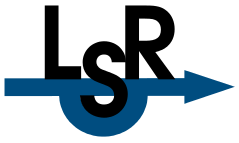Presentation
General description
The InnoLecture course is delivered during the summer semester 2010 by Professor Mamadou Mboup from Université de Reims Champagne-Ardenne (France), as a guest professor of the Mechatronics Department in the framework of the InnoLecture program of the Stifterverband für die Deutsche Wissenschaft. This foundationand the association of the regional industryVerband der Metall- und Elektroindustrie des Saarlandes e.V. provide the financial support enabling the guest professorship.
The course introduces an innovative pedagogical approach, intimately combining lectures with practical work in a novel course format.The subject of the course is Signal Processing in Biomedicine and Mechatronics. It addresses students who have already acquired basic knowledge in fields related to systems theory. It is integrated into the curriculum of the department, such that students can earn ECTS points by completing this course. It is also open to students from other departments, and specifically recommended to students in computer engineering and also to doctoral students.
The content of the course is directly related to Professor Mboup's current research. Complementary to the course, in the InnoLecture Colloquium a series of scientific talks held by internationally recognized researchers is organized. In addition, the annual meeting of the ALIEN(Algebra for Identification and Numerical Estimation) research group, to which Professor Mboup is affiliated, will hold its annual meeting at Saarland University. Public lectures will also be organized on this ocassion.
Organization of the Course "Signal Processing in Biomedicine and Mechatronics"
The course is divided into different phases with intermediary objectives. For each such phase or step, the class is divided into groups (of 2 to 5 students depending on the attendance), competing against eachother. At the end of each step, the groups are evaluated and a synthesis of the works of the different groups is put together. This common work serves as the starting point of the next step, for which the grouping of the students is changed. The overall evaluation of each student is obtained by a combination of the evaluation of the different groups he or she belonged to throughout the consecutive steps. This type of organization is supposed to increase the motivation and the interaction of the students. By solving relevant problems in groups they are trained in cooperative problem solving, such as required in the later professional life when facing complex industrial problems. Skills like oral presentation, discussion and written documentation of the work are also trained.
Teaching program
The focus of the course lies on "change point detection", with two applications: "neural spike detection" and "fault detection and diagnosis". The general principal of detection is the same for both applications. It relies on the new algebraic framework of identification and estimation being developed for both control and signal processing in ALIEN, a project-team ofINRIA (The French National Institute for Research in Computer Science and Control).
Prerequisites
Only basic background in fields related to systems theory are required. Mathematical tools will be recalled where needed, which mainly involve the Laplace transform and elementary rules of operational calculus (as traditionally used in electrical circuits analysis). First experience in Matlab or Scilab programming is of advantage.
Objectives
The objectives of the lecture are twofold: 1) make the students familiar with the new algebraic techniques of identification developed by ALIEN and 2) develop a software such as the development of a Matlab/Scilab toolbox, for example, for neural spike detection, along with a comprehensive user guide. The toolbox and its complete documentation represent the final deliverables. As an example, the first intermediary result will be a report on bibliography related to the topic.



